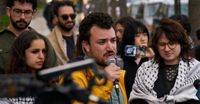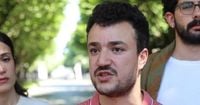A landmark ruling from a federal judge in New Jersey has brought a significant development to the case of Mahmoud Khalil, a former Columbia University graduate student and Palestinian activist detained since March 2025. On June 11, 2025, U.S. District Judge Michael Farbiarz ordered that the government must release Khalil, who had been held under a rarely invoked statute cited by Secretary of State Marco Rubio, which was used to justify his detention and attempted deportation on grounds of national security and foreign policy concerns.
Khalil’s detention and the Trump administration’s efforts to deport him have been at the heart of a fierce legal and political battle, raising questions about free speech, immigration law, and the limits of executive power. The judge’s ruling, which will take effect at 9:30 a.m. on June 13 to allow the government time to appeal, marks a critical setback for the administration’s crackdown on pro-Palestinian activism on U.S. college campuses.
Mahmoud Khalil, who is a lawful permanent resident of the United States, was detained on March 8, 2025, in the lobby of his university-owned apartment at Columbia University. This arrest was the first under President Donald Trump’s intensified efforts to target students involved in protests against the war in Gaza, which erupted after Hamas’s attack on Israel on October 7, 2023. Khalil, an international affairs graduate student at the time, was not arrested for any criminal wrongdoing but rather for his role as a negotiator and spokesperson for pro-Palestinian student activists.
The Trump administration accused Khalil of engaging in activities aligned with Hamas, a designated terrorist organization, and claimed his presence posed "potentially serious adverse foreign policy consequences" for the United States. Secretary of State Marco Rubio invoked a seldom-used provision of the Immigration and Nationality Act of 1952, asserting his authority to expel individuals whose presence threatens U.S. foreign policy interests. Rubio stated, "We do it every day. Every time I find one of these lunatics, I take away their visa." However, no concrete evidence has been publicly presented to substantiate claims that Khalil supported terrorism.
Judge Farbiarz’s ruling emphatically challenged the constitutionality of the government’s actions. He found that detaining and attempting to deport Khalil based solely on the Secretary of State’s determination likely violates constitutional protections. "The Court finds as a matter of fact that the Petitioner’s career and reputation are being damaged and his speech is being chilled — and this adds up to irreparable harm," the judge wrote, highlighting the profound personal and professional consequences Khalil has endured.
Indeed, Khalil’s detention has had tangible impacts. According to statements made in court, the revocation of his green card led Oxfam International to rescind a job offer for a policy adviser position. Khalil’s lawyers also argued that his detention chills constitutionally protected free speech, deterring him and others from engaging in lawful protests. The judge’s order acknowledged these harms, underscoring the broader implications for civil liberties.
Despite the ruling, the judge allowed for the possibility that Khalil could remain detained on other grounds, specifically allegations that he provided incomplete or inaccurate information on his green card application. However, Farbiarz expressed skepticism about this justification, noting that lawful permanent residents are "virtually never detained pending removal" for such omissions. He wrote, "And that strongly suggests that it is the Secretary of State’s determination that drives the Petitioner’s ongoing detention — not the other charge against him." This distinction is critical, as it points to the political nature of Khalil’s detention rather than any procedural immigration violation.
Khalil’s legal team, including Ramzi Kassem, a co-founder of the Center for Constitutional Rights, hailed the ruling as a major victory. Kassem stated, "The court’s decision is the most significant vindication yet of Mahmoud’s rights," and added, "This vindicates what Mahmoud has maintained since day one — that the government cannot detain or deport him based on Rubio’s say-so." The American Civil Liberties Union, which is also representing Khalil, called the injunction "a huge win."
Dr. Noor Abdalla, Khalil’s wife and a U.S. citizen, expressed cautious optimism following the ruling. She said, "This is the news we’ve been waiting over three months for," referring to the period since Khalil’s detention began. Abdalla also shared the personal toll of Khalil’s absence, noting that he missed the birth of their son, Deen, who was born while Khalil was held in a federal detention center in Jena, Louisiana. Khalil recounted the painful experience: "Instead of holding my wife’s hand in the delivery room, I was crouched on a detention center floor, whispering through a crackling phone line as she labored alone. I listened to her pain, trying to comfort her while 70 other men slept around me. When I heard my son’s first cries, I buried my face in my arms so no one would see me weep." The family hopes Khalil can return to New York in time to celebrate his first Father’s Day with his son.
The Trump administration has not relented, confirming its intent to appeal the ruling. A Department of Homeland Security spokesperson stated, "Today’s ruling delays justice and seeks to undermine the President’s constitutionally vested powers under Article II. We expect a higher court to vindicate us in this." The government argues that noncitizens who participate in protests deemed antisemitic or "pro-Hamas" should be subject to deportation. This policy has led to the detention of other students, including Mohsen Mahdawi, another Columbia student, Rumeysa Ozturk, a Tufts University graduate student, and Badar Khan Suri, a Georgetown University scholar. Some of these students have been released following judicial intervention, but all remain at risk of deportation proceedings.
Critics of the administration’s approach have likened the crackdown to McCarthy-era tactics, accusing the government of suppressing free speech and targeting political activists. The judge in Mahdawi’s case explicitly compared the government’s conduct to the 1950s Red Scare. Advocates argue that the government’s actions threaten fundamental First Amendment rights and undermine the principle of due process.
As the legal battle continues, Khalil’s case has become emblematic of the tension between national security claims and civil liberties in the context of immigration enforcement. The judge’s ruling underscores the judiciary’s role in checking executive overreach and protecting constitutional rights, even amid politically charged controversies. Whether Khalil will be freed by Friday or remain in detention pending appeal remains uncertain, but the ruling has undeniably shifted the momentum in his favor.
For now, the nation watches closely as this high-profile case unfolds, highlighting the complexities of immigration law, activism, and the enduring struggle for free expression in America.


